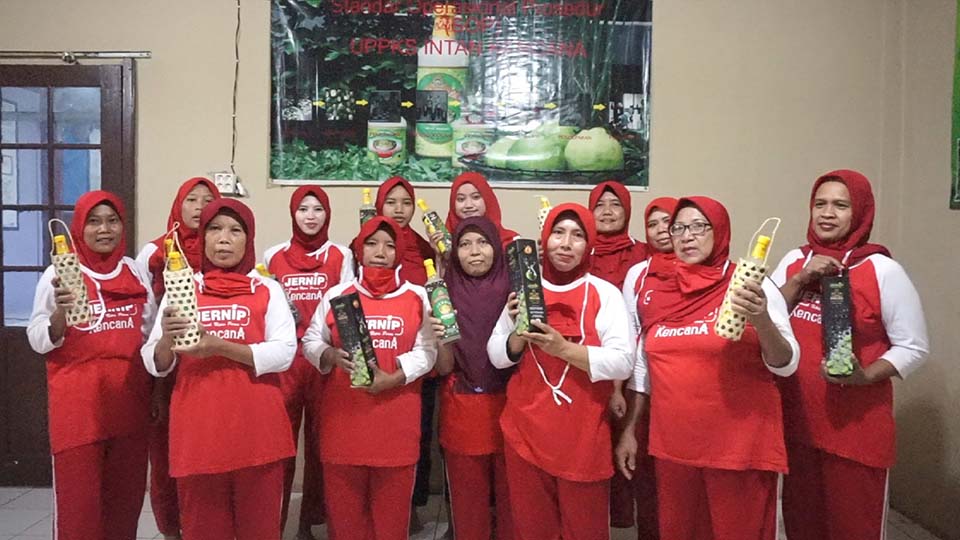Courage and Determination Led Fijian Single Mother to Create Successful Cocktails and Mocktails Bases
While Lorrena Eyre always wanted to work in food and beverage, she did not imagine she would create cocktail bases that would become the favorites of several bars and restaurants in Fiji. Sourcing all her ingredients from small local farmers, she now has a complete offering and is looking to expand her coverage and launch new products.
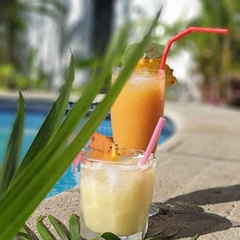
Lorrena grew up in the hotel industry. Her mother was at the front office while her father was a chief engineer. She spent most of her childhood in hotels and developed an interest in food and beverage. Her dream was to become a food and beverage manager.
However, her life took a different turn as she married and became the mother of four children. After her divorce, she went back to school to pursue her passion, studying food and beverage. She discovered she was mainly interested in beverages.
After working for a few years for different companies, she set up a party rent business, but when Covid-19 hit, events disappeared. The after-Covid period did not bring back customers, who were watchful of their spending.
Customer-Rated as “Best Juice for Cocktails”
“There were those open markets in Nadi and Suva [both on the main Fiji Island of Viti Levu] where people sell what they could,” she remembered. “I created dream catchers, pickles, and a juice I made from local fruits and coconut.”
The interest was immediate. She sold her juice at the market by the cup, but soon, returning customers came with their bottles to be filled up. With the juice, they made their best piña colada, they said. She knew she had a promising product and started approaching bars to test the market. The feedback was excellent.

After the University of The South Pacific approved her nutrition chart, she created her label and formally launched CocoPine at the end of 2021 with her eponym drink CocoPine juice, a preservative-free mix of pineapple and coconut.
CocoPine comes in 2-liter bottles. The juice keeps frozen for up to three months, seven to ten days in the fridge after opening, and two weeks unopened.
CocoPine Fruit Juices as a Cocktail and Mocktail Base
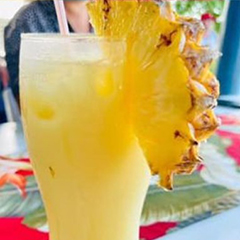
While refining her lead product, CocoPine, Lorrena developed three other juices. One is Tropic Crush, which combines four local fruits on a coconut base, mainly used for fruit punch. The other two beverages created by her daughters were Le Mint Lush: a mint and lemon juice with a dash of coconut, used for mojitos and custom-made cocktails, often with tequila, and O Mango: mango juice in a coconut base, used primarily for daiquiri.
Bars and restaurants also use her juices on ice to make mocktails, which are non-alcoholic cocktails.
CocoPine’s business model is primarily based on B2B as the juices are used as a cocktail base, but the company also sells to individual customers through its Facebook Page.
Making Easy and Quick Cocktails with CocoPine Fruit Juices
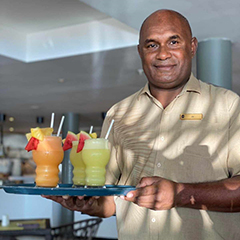
CocoPine has unique qualities for bars and restaurants, Lorrena explained. The drinks contain fruits, coconut, some lemon, and sugar. They are pasteurized and bottled, ready to use. She said a bartender would have to peel, chop the fruits, blend them, and mix everything together to prepare any cocktail out of fruits. Serving five customers might take twenty minutes, but with CocoPine juices, the same customers can be served in less than five minutes. It saves hospitality businesses a lot of time and storage space, and they do not have to manage fresh fruits.
Located in Lautoka, Fiji’s second-largest city on the west coast of the main Fijian island, the company produces between 800 and 1,000 bottles of juice weekly.
Overcoming Fiji’s Fruit Seasonality for Year-Round Fruit Juices Distribution
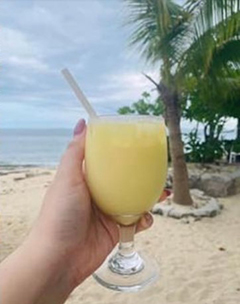
Fruits are seasonal, and to keep production at the same level all year around, Lorrena pulps fruits before they get out of season and freezes them. That is one of the challenges, she said.
Another one might seem surprising as she says the business is really growing, and orders are mounting. But that sustained growth is hard to meet without stepping up the company’s equipment, such as bottling, packaging, and labeling machines. “As a single mother, I started in my kitchen,” she said, without any seed investment. The company is now staffed with 14 people.
Protecting CocoPine’s Secret Recipes and Building Up the Brand
Her success has not escaped competitors who have tried to hire her staff to get her recipes and even buy her company. Lorrena is currently working to protect her trademark and relies on trade secrets for her recipes.
She joined the multi-stakeholder training on the strategic use of intellectual property for small businesses organized by WIPO at the margins of the Heads of IP Office Conference (HIPOC), and will benefit from mentoring under WIPO’s IP Management Clinics in the coming months.
She is considering launching other products, such as syrups and fruit pulps.
In the next five years, she hopes her CocoPine juices can be available to all Fiji hotels and social clubs, and can be exported to neighboring countries, in particular New Zealand and Australia.



